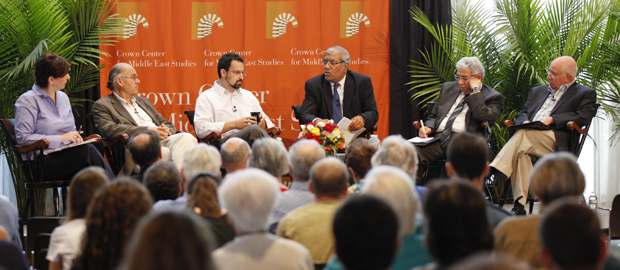From Gaza to Iraq: Crown Center panel covers major topics in Middle East
Panelists weighed recent events in Gaza and Iraq
 Photo/Mike Lovett
Photo/Mike LovettPanelists from the Crown Center's Flashpoints in the Middle East. From left: Eva Bellin, Kanan Makiya, David Patel, Khalil Shikaki, Abdel Monem Said Aly and Shai Feldman
One day after a ceasefire was agreed upon in Israel and Gaza, the Crown Center for Middle East Studies at Brandeis University held a panel discussion where scholars looked back on the events of the summer in the Middle East and toward the future.
"This has been a moral and humanitarian catastrophe," said Eva Bellin, Myra and Robert Kraft Professor of Arab Politics, who moderated the panel. "It has weighed heavily on the hearts of anyone who follows Middle East affairs ... we really need to get some leverage on whether there is some way out of this."
"Flashpoints in the Middle East," held Aug. 27 in Rapaporte Treasure Hall the at Goldfarb Library, featured Crown Center Director Shai Feldman, Sylvia K. Hassenfeld Professor of Islamic and Middle East Studies Kanan Makiya, Crown Center Junior Research Fellow David Patel, Director of the Regional Center for Strategic Studies in Cairo and Crown Center Senior Fellow Abdel Monem Said Aly, and Director of the Palestinian Center for Policy and Survey Research Khalil Shikaki, who is also a senior fellow at the Crown Center.
The discussion touched on recent events in Gaza and Iraq, how they impacted the region, and what could be in store for the future.
Hamas, then and now
Khalil Shikaki said it remains to be seen how the Gaza war has affected Hamas internally. Before the war, Hamas decision makers believed the organization within Gaza was too weak to go on. But its military leaders, who had spent five years building a military infrastructure in Gaza, believed otherwise, he said.
Now, Hamas has more involvement regionally and in negotiations with Israel and the Palestine Authority, Shikaki said.
"Hamas, today, is 10 times stronger than it was before the start of the war," Shikaki said.
Hamas would likely attempt to maintain and boost popularity by focusing on a narrative of victory, he said.
"At this point, I think Hamas hopes that its ability to sell its narrative of victory is sufficient to help them gain significant popular standing," he said.
Will Netanyahu consider accepting a two-state solution?
In the aftermath of 50 days of fighting, Shai Feldman wondered whether Benjamin Netanyahu would consider accepting the concept of a two-state proposal. He had previously rejected it, but there is a history of Israeli leaders making unexpected decisions, Feldman said.
"Does he have it in him to take these very bold steps?" Feldman said.
From a regional perspective, it is a prime moment for Israel to form coalitions, but it has to resolve its own conflicts first, Feldman said.
The U.S. Role in Iraq
As the discussion turned to Iraq and ISIS, the panelists weighed what role the United States should play.
David Patel said the U.S. should not underestimate the ability ISIS has to last in the region, given its ability to both take over and control large cities.
Patel said he believed the U.S. would take a role of gathering intelligence and executing strategic air strikes against ISIS in the near future, but would likely have to expand involvement in fighting ISIS – both in Iraq and Syria -- eventually.
"I think ISIS is a generation-long struggle ... this is the beginning of a very long war," he said.
Kanan Makiya said he believes ISIS, given its "apocalyptic" agenda combined with its questionable ability to hold territory, likely won't last. But it needs to be treated as a mortal threat before it can be defeated. The U.S. has a moral obligation to be involved in Iraq, and Arab states should be involved as well, he said.
"There are long-term issues here that are going to be violent and deadly ... the Arab states have to become involved in these issues," Makiya said. "This is a part of the world that has to take responsibility for its own crisis and catastrophes, all of which are its own making."
Abdel Monem Said Aly said the U.S. should take caution in getting involved with ground troops, pointing to the previous war in Iraq. He suggested the U.S. should instead focus on how it can apply technology to conflicts in the region.
"Americans were absolute failures at putting boots on the ground," Said Aly said. "What the Americans are good at is technology."
A full video of the event is available online.
The panel was the first in a series of events to be hosted by the Crown Center during the 2014-15 school year as it celebrates its tenth anniversary. The center's website features its events and publications written by its researchers.
Categories: International Affairs





